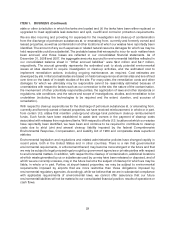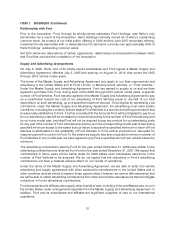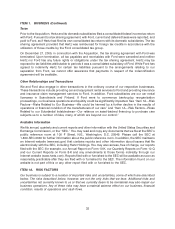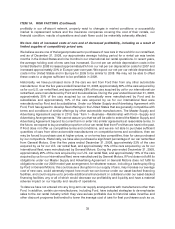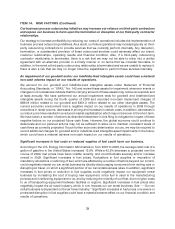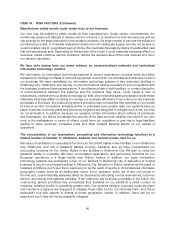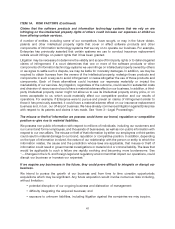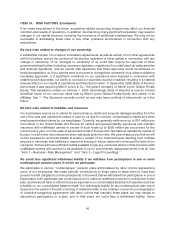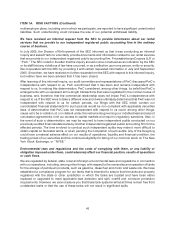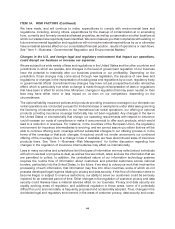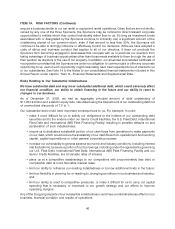Hertz 2008 Annual Report Download - page 56
Download and view the complete annual report
Please find page 56 of the 2008 Hertz annual report below. You can navigate through the pages in the report by either clicking on the pages listed below, or by using the keyword search tool below to find specific information within the annual report.ITEM 1A. RISK FACTORS (Continued)
Reduced or limited supplies of equipment together with increased prices are risks that we also face in
our equipment rental business. We cannot offer assurance that we will be able to pass on increased
costs of cars or equipment to our rental customers. Failure to pass on significant cost increases to our
customers would have a material adverse impact on our results of operations and financial condition.
We face risks related to decreased acquisition or disposition of cars through repurchase and
guaranteed depreciation programs.
For the year ended December 31, 2008, approximately 57% of the cars purchased in our combined U.S.
and international car rental fleet were subject to repurchase by car manufacturers under contractual
repurchase or guaranteed depreciation programs, or ‘‘program cars.’’ Under these programs, car
manufacturers agree to repurchase cars at a specified price or guarantee the depreciation rate on the
cars during a specified time period, typically subject to certain car condition, mileage and holding period
requirements. These repurchase and guaranteed depreciation programs limit the risk to us that the
market value of a car at the time of its disposition will be less than its estimated residual value at such
time. We refer to this risk as ‘‘residual risk.’’
Repurchase and guaranteed depreciation programs enable us to determine our depreciation expense in
advance. This predictability is useful to us, since depreciation is a significant cost factor in our
operations. Repurchase and guaranteed depreciation programs are also useful in managing our
seasonal peak demand for fleet, because some of them permit us to acquire cars and dispose of them
after relatively short periods of time. A trade-off we face when we purchase program cars is that we
typically pay the manufacturer of a program car more than we would pay to buy the same car as a
non-program car. Program cars thus involve a larger initial investment than their non-program car
counterparts do. If a program car is damaged and we are unable to recover the cost of the damage from
our customer or another third party or the car otherwise becomes ineligible for return or sale under the
relevant program, our loss upon the disposition of the car will be larger than if the car had been a
non-program car, because our initial investment in the car was larger.
Over the past five years, the percentage of our car rental fleet subject to repurchase or guaranteed
depreciation programs has substantially decreased due primarily to changes in the overall terms offered
by automobile manufacturers under repurchase programs. As of December 31, 2008, approximately
24% of our fleet consisted of cars purchased from Ford, of which approximately 32% were program cars
and approximately 28% of our fleet consisted of cars purchased from General Motors, of which
approximately 32% were program cars. In the aggregate, approximately 29% of our fleet as of
December 31, 2008, consisted of program cars. Accordingly, we are now bearing increased risk relating
to the residual market value and the related depreciation on our car rental fleet and must use different
rotational techniques to accommodate our seasonal peak demand for cars.
Repurchase and guaranteed depreciation programs generally provide us with flexibility to reduce the
size of our fleet by returning cars sooner than originally expected without risk of loss in the event of an
economic downturn or to respond to changes in rental demand. This flexibility has been reduced as the
percentage of program cars in our car rental fleet has decreased materially. See ‘‘Item 1—Business—
Worldwide Car Rental—Fleet’’ and ‘‘Item 7—Management’s Discussion and Analysis of Financial
Condition and Results of Operations—Overview’’ in this Annual Report.
Our car manufacturers may fail to fulfill their obligations to repurchase or guarantee the depreciation of
program cars under our current or future arrangements with them, for whatever reason including a
bankruptcy filing, or in the future, car manufacturers could modify or eliminate their repurchase or
guaranteed depreciation programs or change their return policies (which include condition, mileage and
36





